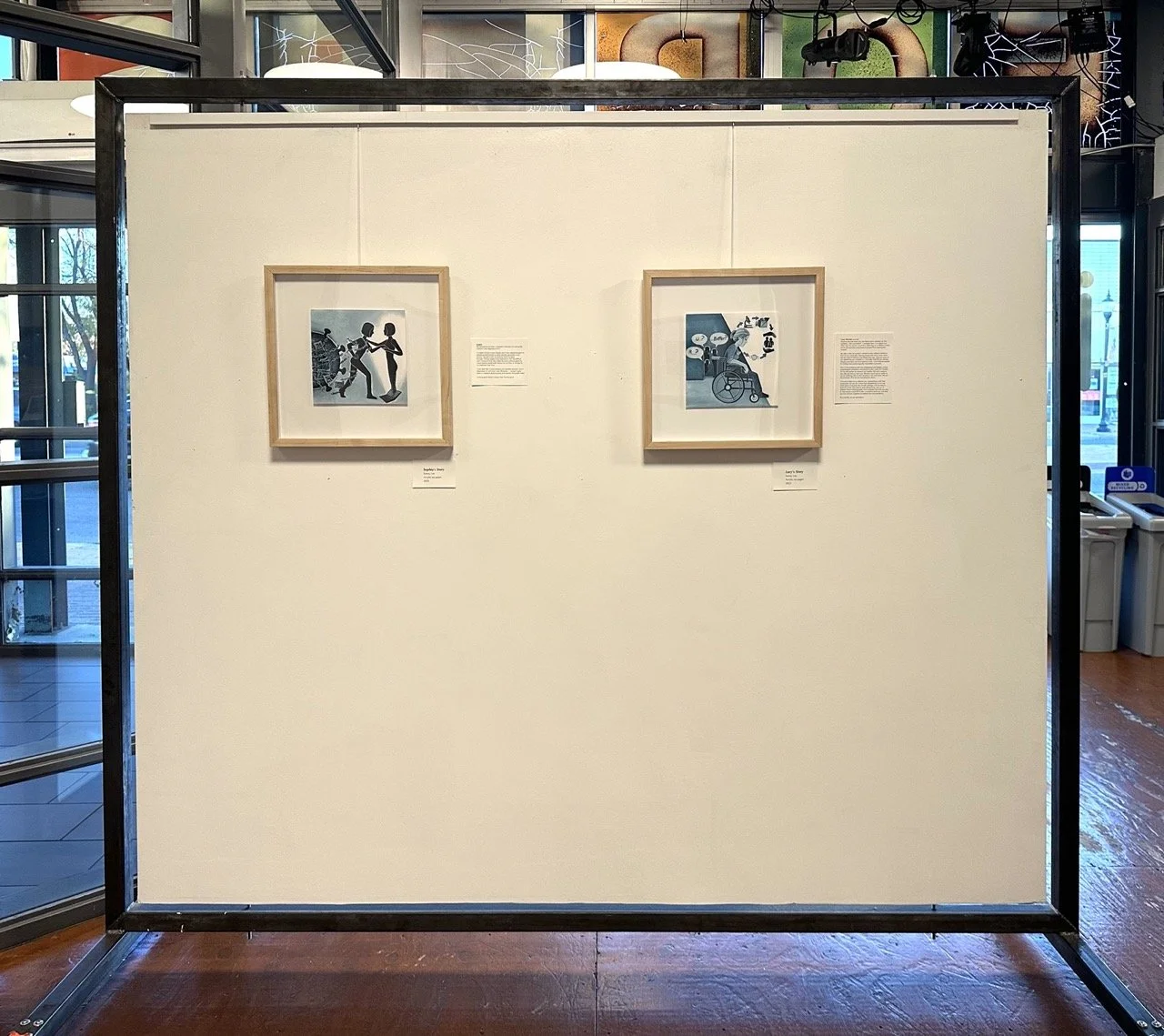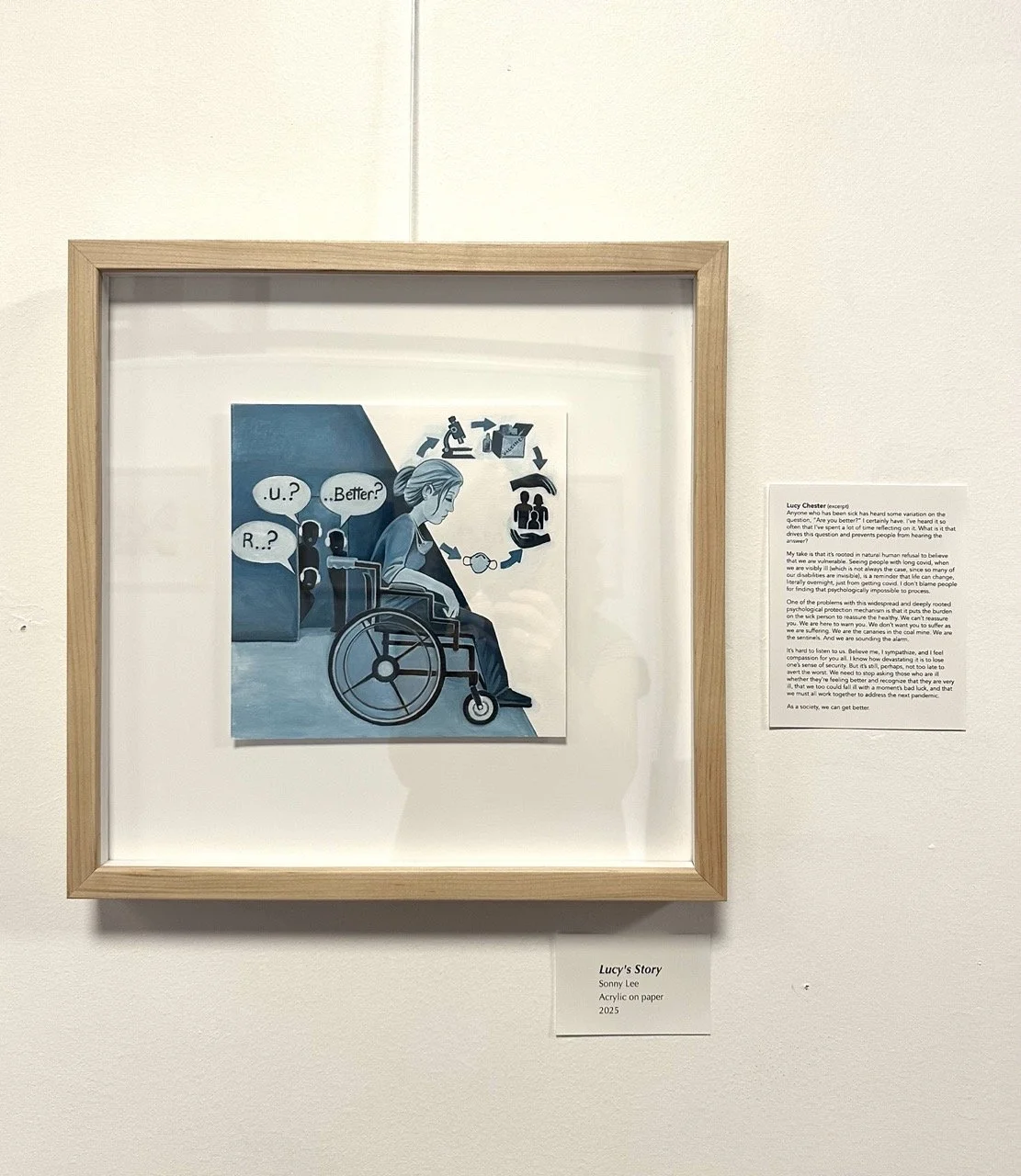Lucy Chester
“Are You Better?”
Anyone who has been sick has heard some variation on the question, “Are you better?” I certainly have. I’ve heard it so often that I’ve spent a lot of time reflecting on it. So have others with disabilities. For some people, it sparks anger.[1] I don’t begrudge them that anger in any way; I am Filled with rage every day, to be honest.
I think this question reveals some important truths. It is difficult to hear, yes, and I would rather not have to tell people (while I’m sitting in my wheelchair, wearing my mask) that no, I am not better. Having to articulate that reality is yet another pinprick, yet another tiny drain on my energy and resilience. I also recognize that the question comes from a place of genuinely wanting to see me improve, feel better, return to the capable person I was before – tinged with a little disbelief that I haven’t recovered.[2] One of the problems with “Are you better?” is that it requests an answer. I don’t want to imply that one should never inquire after the wellbeing of a disabled or chronically ill person. There are many wonderful, supportive variations, from “How are you, really?”, which I deeply appreciate, to “I hope you’re feeling better,” which carries some of the same resonance as “Are you better” but at least doesn’t require a response from me.
When I hear “are you better?”, mainly I feel compassion and wry regret. I have concluded that this particular phrasing of the question comes from a place of deep unwillingness to recognize our own vulnerability.[3] Don’t get me wrong – I recognize that it also comes from care and a hope that I will get better. But in my experience, that hope is slightly undermined by the fact that it’s so often, nearly universally, intertwined with an inability to hear what I am saying. A recent example (from someone I deeply respect and like and have a long history with):
“Are you feeling better?” “No, it’s pretty much the same” (which is my stock answer). “So, you’re a bit better?”
I know this person is thoughtful, caring, and intelligent – as are the many other people with whom I have similar interactions. There must be something powerful going on that inhibits understanding of what I’m saying: no, I am not better. What is it that drives this question and prevents people from hearing the answer?
My take is that it’s rooted in natural human refusal to believe that we are vulnerable – unless we have it rubbed in our faces and cannot deny it anymore, as happens with a sudden disability. It is terrifying to acknowledge that one could lose mobility, balance, cognitive skills, the ability to eat normally, and even the ability to get out of bed, simply from getting a virus. Seeing people with long covid, when we are visibly ill (which is not always the case, since so many of our disabilities are invisible) is a reminder that life can change, literally overnight, from getting covid. I don’t blame people for Finding that psychologically impossible to process.
I Find myself using “we” for both sides of this conversation, which actually makes sense, because it’s not us vs them. We are not separate in this struggle. We are all together, even though some of us Find it difFicult or impossible to recognize that we face the same challenges.
I understand the temptation of denial. I freely admit that I struggled with denial of my illness and disability for many months. Over three years later, I still can’t say I’ve accepted it. But I have accepted that I need to drastically adjust my activities in order to avoid exacerbating my symptoms and potentially ending up bedbound. And I no longer expect to “get better.” So I would say I’m in partial acceptance.
It can be hard to express what living with long covid or chronic fatigue syndrome is like.[4] Many of those living with these illnesses dislike the term “chronic fatigue,” preferring the label “myalgic encephalomyelitis.”[5] Whatever you call it, ME/CFS and the ME Flavor of long covid are brutal conditions.[6] There is no treatment, although there are some interventions that, in some people, some of the time, can make some symptoms more bearable. My personal experience is that therapies designed for people with traumatic brain injuries have been the most effective.[7]
The main intervention used by nearly everyone with ME/CFS is pacing. Pacing involves limiting one’s activities. It means limiting our work and play, at the very least. For many of us, it means staying home. For some of us, it means staying in bed.
Four years ago, I would have been delighted at the prospect of hanging out at home, eating bonbons and binging shows. Unfortunately, two things are true. First, even Netflix and chill gets old after a while (ask anyone who’s been on pregnancy bedrest). Second, pacing for chronic fatigue looks less like catching up on all those great shows and more like limiting or eliminating screen time, book time, and social time, while cutting back on climbing stairs or even walking from one room to the next. For those with severe fatigue, it often means limiting exposure to any sounds or light. It can mean tube feeding and bedside toileting, with some sufferers unable to sit up or even turn over in bed. So much for bonbons and watching TV.
As scientists found in 2022, fatigue in the context of long covid can lead to a quality of life measurably worse than that of patients with end-stage renal disease or stage IV lung cancer. One of the study leaders said, “long Covid can leave people with worse fatigue and quality of life than some cancers, yet the support and understanding is not at the same level. We urgently need more research to enable the development of evidence-based services to support people trying to manage this debilitating new condition.”[8] Functional impairment in this study was worse than that experienced by stroke survivors and comparable to that for people with Parkinson’s disease.[9]
I cite these facts not to compete for sympathy with others. My goal is to shine a light on what we’re experiencing - and to warn you, dear reader, while you can still avoid joining us in this darkened land.
The denial apparent in the question, “Are you better?” is part of a larger problem that damages all of us. This unwillingness to come to grips with reality prevents us, as a society, from taking the steps we need to take in order to protect ourselves against the next pandemic.
What are those steps? We must fund the rigorous science necessary to monitor outbreaks, develop vaccines, and research treatments. We need to make the societal changes that will allow us all to take commonsense measures to protect ourselves and others, including essential workers. We have to think creatively and generously to Find ways to maintain crucial social functions such as education during pandemics, without exposing teachers, students, janitors, food service workers, and more to unnecessary risk. These steps are both simple and immensely complicated.
They are also impossible to take if we allow ourselves to be lulled into denial. Scientists are warning us that the next pandemic is inevitable.[10] I and my fellow long-covid and post-viral syndrome sufferers can tell you what that means, in human terms. But if wide-spread denial prevents society from hearing what we’re saying, I fear our suffering may be in vain.
One of the problems with this widespread and deeply rooted psychological protection mechanism is that it puts the burden on the sick person to reassure the healthy. We can’t reassure you. We are here to warn you. When we ask you to wear masks, test if you feel ill, respect your school or building’s obligations under the Americans with Disabilities Act, not park in ADA spots even if it’s “just for a minute,” and so on, we are not trying to give you a hard time. We don’t want you to suffer as we are suffering. We are the canaries in the coal mine. We are the sentinels. And we are sounding the alarm.
It’s hard to listen to us. Believe me, I sympathize, and I feel compassion for you all. I know how devastating to lose one’s sense of security. But it’s still, perhaps, not too late to avert the worst. We need to stop asking those who are ill whether they’re feeling better and recognize that they are very ill, that we too could fall ill with a moment’s bad luck, and that we must all work together to address the next pandemic.
As a society, we can get better.
[1]Sophie Strand, “I Hope You Are Feeling Better,” Make Me Good Soil, 13 March 2025, https://sophiestrand.substack.com/p/i-hope-you-are-feeling-better, accessed 10 September 2025.
[2] AI disclosure: I have not used any form of AI in writing this piece. All em dashes are my own.
[3] Strand makes a similar point in her “I Hope You Are Feeling Better,” relating what she sees as fear of incurably ill people to societal inability to address environmental devastation effectively.
[4] For an overview of the relationship between long covid and ME/CFS, see Isman Moneer, “Long COVID, ME/CFS and the Importance of Studying Infection-Associated Illnesses,” https://www.yalemedicine.org/news/long-covid-mecfs-and-the-importance-of-studying-infection-associated-illnesses, accessed 15 September 2025. For a peer-reviewed comparison of the two, see Wong TL,Weitzer DJ, “Long COVID and Myalgic Encephalomyelitis/Chronic Fatigue Syndrome (ME/CFS)-A Systemic Review and Comparison of Clinical Presentation and Symptomatology” Medicina (Kaunas) 2021 Apr 26;57(5):418. doi: 10.3390/medicina57050418. PMID: 33925784; PMCID: PMC8145228.
[5] Centers for Disease Control, “ME/CFS Basics,” https://www.cdc.gov/me-cfs/about/index.html, accessed 15 September 2025.
[6] It has been clear for several years that there are different sub-types of long covid, which tend to involve clusters of symptoms. Clusters often overlap but may center on problems with breathing, heart damage, fatigue, cognition, or smell and taste. Scientists have yet to reach consensus on the number or nature of such clusters, but one useful study is Justin T Reese, Heidi Spratt, Lorna E Thorpe, et al, “Generalisable Long COVID Subtypes: Findings from the NIH N3C and RECOVER Programmes,” eBioMedicine 87, 104413.
[7] Huge thanks to Dr. Amy Chang and Annie at Niwot Vision Therapy.
[8] Rachel Hall, “Long Covid Can Impair Quality of Life More Than Advanced Cancers, Study Says,” The Guardian 7 Jun 2023, https://www.theguardian.com/society/2023/jun/08/long-covid-impact-quality-of-life-cancer- study, accessed 13 September 2025.
[9] S Walker, H Goodfellow, P Pookarnjanamorakot, et al, “Impact of fatigue as the primary determinant of functional limitations among patients with post-COVID-19 syndrome: a cross-sectional observational study,” BMJ Open 2023;13:e069217, doi:10.1136/bmjopen-2022-069217.
[10] Emily Gaines Buchler, “Health Security: Are We Ready for the Next One?” Johns Hopkins Magazine, Spring 2025,
https://hub.jhu.edu/magazine/2025/spring/ready-for-next-pandemic/,
accessed 15 September 2025.



Lucy Chester, Associate Professor of History and International Affairs at CU Boulder, is the author of Borders and Conflict in South Asia: The Radcliffe Boundary Commission and the Partition of Punjab (Manchester UP, 2009)
